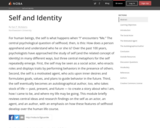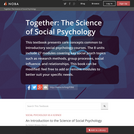
For human beings, the self is what happens when “I” encounters “Me.” The central psychological question of selfhood, then, is this: How does a person apprehend and understand who he or she is? Over the past 100 years, psychologists have approached the study of self (and the related concept of identity) in many different ways, but three central metaphors for the self repeatedly emerge. First, the self may be seen as a social actor, who enacts roles and displays traits by performing behaviors in the presence of others. Second, the self is a motivated agent, who acts upon inner desires and formulates goals, values, and plans to guide behavior in the future. Third, the self eventually becomes an autobiographical author, too, who takes stock of life — past, present, and future — to create a story about who I am, how I came to be, and where my life may be going. This module briefly reviews central ideas and research findings on the self as an actor, an agent, and an author, with an emphasis on how these features of selfhood develop over the human life course.
- Subject:
- Psychology
- Social Science
- Material Type:
- Module
- Provider:
- Diener Education Fund
- Provider Set:
- Noba
- Author:
- Dan P. McAdams
- Date Added:
- 10/31/2022
